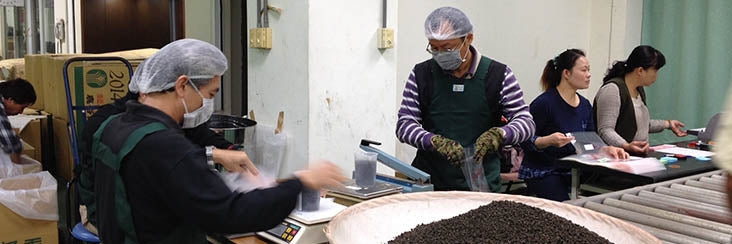
Taiwan Tea Competitions: A Comprehensive Overview
Here are some answers to questions about tea competitions in Taiwan. These regional competitions set a precedent of quality and value for all of the tea growing regions in Taiwan. The number of competitions alone is an impressive represenation of the specialty tea industry in Taiwan.
What are the most distinguished specialty tea competitions, and why?
The most distinguished tea competition in Taiwan is the Oriental Beauty Oolong Tea competition in Emei, Hsinchu County in northern Taiwan. This is because Oriental Beauty is a traditional Oolong Tea that is made with the help of the Green Leaf Hopper insect that likes to feed on the sap of tea leaf buds. Authentic, bug bitten Oriental Beauty is only produced in very small quantities each year, and so demands the highest value.
Second to Oriental Beauty for being a specialty tea competition is Tieguanyin Oolong - produced in Muzha, Taipei. This is for similar reasons as the Oriental Beauty, minus the help of the Green Leaf Hopper. Tieguanyin is a traditional Oolong Tea that is grown from an heirloom strain of tea plants in extremely small amounts in the hills just outside of Taipei City. It also is a prime example of an artisan tea in that it requires knowledge, skill, and an extraordinary amount of time to make.
 What are the top five tea competitions based on number of entries and/or value of prize-winning teas?
What are the top five tea competitions based on number of entries and/or value of prize-winning teas?
- Lugu Farmers’ Association Dong Ding Oolong Tea
- Emei Farmers’ Association Oriental Beauty Tea
- Meishan Farmers’ Association High Mountain Tea
- Yuchi Farmers’ Association Black Tea
- Heping Farmers’ Association High Mountain Tea
What tea competition has been a model for others to follow?
The Lugu Farmers’ Association Dong Ding Oolong Tea Competition was the first competition to be established in 1976, and has been the primary model for other competitions to follow.
What tea competitions are most sought after by foreign markets?
- Lugu Farmer’s Association (Dong Ding Oolong Tea)
- Alishan Farmers’ Association (Alishan High Mountain Tea)
- Emei Farmers’ Association (Oriental Beauty Tea).
What percentage of Taiwan tea competitions is Oolong Tea?
At least 90% of all competitions in Taiwan is Oolong Tea.
Have Taiwan's tea competitions influenced the development of tea competitions in other countries?
Yes, Taiwan tea competitions have been emulated in mainland China.
Did Taiwan initially follow the example of other foreign tea competitions?
Only insofar as using basic implements of a porcelain lidded cup and tea bowl for tea assessment, which were adopted from the tea industry in India.
How many tea competitions are there in Taiwan?
The number of competitions produced by regional Farmers' Associations and well established tea trade associations is about 25 . There are also other competitions that are held less consistently by various enterprises, but these are the standard established competitions that are held on a bi-annual (spring and winter) or annual basis (Oriental Beauty and Black Tea). Most competitions are conducted by local farmers’ associations, so these are listed first. The sizes of these competitions vary greatly – from only a hundred plus to over 6000 entries.
Farmers’ Associations (by county, locale, and tea type - from North to South of the island):
Taipei County
Sanxia: Biluochun Green Tea
Wenshan: Baozhong Oolong Tea
Muzha: Tieguanyin Oolong Tea
Hsinchu County
Emei: Oriental Beauty Oolong Tea
Taichung County
Heping: High Mountain Oolong Tea (Lishan; Dayuling)
Nantou County
Renai: High Mountain Oolong Tea (Tsuifeng; Qilaishan, etc.)
Yuchi: Black Tea (Taicha #18; Assam; Mountain/wild strain)
Xinyi: High Mountain Oolong Tea (Yushan)
Nantou City: Green Mountain Oolong Tea
Mingjian: Jin Xuan Oolong Tea,
Tsui Yu Oolong Tea,
Qing XinOolong Tea,
Four Seasons Spring Oolong Tea
Zhushan: Oolong Tea, (Shanlinxi)
Jin Xuan Oolong Tea
Lugu: Dong Ding Oolong Tea
Chiayi County
Meishan: High Mountain Oolong Tea (Alishan; Rueli, Zhangshuhu)
Alishan: High Mountain Oolong Tea
There are also other associations that have been established to promote their local specialty teas through education and marketing – mainly in the form of tea competitions, such as:
Nantou Tea Trade Organization: Jin Xuan Oolong Tea
Tsui Yu Oolong Tea
Qing Xin Oolong Tea
Four Seasons Spring Oolong Tea
Zhushan Jin Pai Zhang (private company): High Mountain Oolong Tea
Dong Ding Tea Cooperative: Dong Ding Oolong
New Varietal (Jin Xuan Oolong)
Yonglong/Fenghuang District Dong Ding Oolong Tea
These competitions are not only a marketing strategy. They also preserve tea culture and local pride in traditional products of regional origin. In some cases, there are competition fairs held by the host facility after the results are publicized where the public can come learn about tea production and quality assessment from professionals. Consumers can also sit down and drink tea with the producers, and buy directly from the source. This is a modern paradigm of tea culture that Taiwan has developed. In certain regions, it preserves an artisan tradition that would probably not survive the purely commercial trends in the industry.

We have learned a great deal from both professional tea judges and tea artisans who participate in tea competitions about recognizing the quality of specialty tea. While there is controversy among tea makers as to the validity of various aspects of competition methodology, there can be no denying that these competitions have sustained the quality and value of specialty teas as well as traditional teas of regional origin.



 What are the top five tea competitions based on number of entries and/or value of prize-winning teas?
What are the top five tea competitions based on number of entries and/or value of prize-winning teas?
